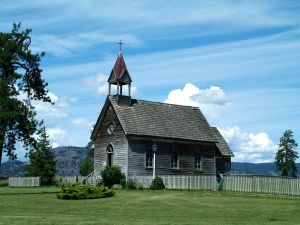 Tim Keller has posted an interesting article on his blog entitled, The Country Parson. In this article, Keller, the ardent advocate of urban church planting lauds the small country church as a training ground for young pastors. Keller is probably the last person you would ever expect to encourage pastors to live out their years in small country churches, yet his advice is both wise and timely for pastors struggling in small churches and for church planters and young pastors looking for ways to grow and cut their teeth in ministry.
Tim Keller has posted an interesting article on his blog entitled, The Country Parson. In this article, Keller, the ardent advocate of urban church planting lauds the small country church as a training ground for young pastors. Keller is probably the last person you would ever expect to encourage pastors to live out their years in small country churches, yet his advice is both wise and timely for pastors struggling in small churches and for church planters and young pastors looking for ways to grow and cut their teeth in ministry.
Many young leaders perceive that the ideal first ministry position would be a position on the staff of a large church with an older, mature pastor to mentor them. The limits of this model are several. You can’t teach a younger pastor much about things they aren’t actually doing. And in a large church they aren’t a) bearing the burden of being the main leader, b) leading a board of elders, c) fund-raising and bearing the final responsibility of having enough money to do ministry, d) and doing the gamut of counseling, shepherding, teaching, preaching. In a smaller church as a solo pastor you and only you visit the elderly, do all the weddings and funerals, sit by the bedside of every dying parishioner, do all the marriage counseling, suspend and excommunicate, work with musicians, craft and lead worship, speak at every men’s retreat, women’s retreat, and youth retreat, write all the Bible studies and often Sunday School curriculum, train all the small group leaders, speak at the nursing home, work with your diaconate as they try to help families out of poverty, evangelize and welcome new visitors to the church, train volunteers to do some (but not all) of all of the above tasks, and deal with the once-a-month relational or financial crisis in the church. No amount of mentoring can teach you what you learn from doing all those things.
Wow, how’s that for some personal advice. I remember my pastor telling me when I left my last ministry setting as an associate pastor to become the pastor of Malvern Hill that he thought I was as ready as I could be, but that there were certain things that could only be experienced as a pastor, not taught (Thanks, Rufus, you were right).
My only critique of Keller’s statement is a reminder to pastors that a small country church (or a medium sized church, or a large church) should never be seen merely as a stepping stone for a pastor to grow and move on. I doubt that Keller is suggesting it should be, but I fear that many readers and eager young pastors will read Keller’s advice and will seek out a small church who is willing to take a chance on them only to use the church as a resume builder. Gospel ministry is much less about what you can get out of it than it is about what you can give to others for the glory of God.
The church of Christ, no matter its size or location, needs pastors who will love God and the gospel and the people of God and the people who need God. Falling in love with a small country church and serving that church with all of the gifts and abilities God has given you will prepare you to fall in love with other communities and other settings and to give the same things in those settings. Ultimately, your task as a pastor is not to prepare yourself to move on, so much as to prepare the people under your care to move on. It is not God’s plan to put every able pastor in urban mega-churches and uber hip mega-church plants. Jonathan Edwards, David Brainerd, Adoniram Judson, and William Carey may be known in Christian History, but they never pastored large congregations in urban areas. Instead, they gave their lives in service to their God and used the incredible gifts God had given them to glorify God and to reach the nations, not to prepare for their next big thing in ministry.
May God give us all the passion and desire of John the Baptist, that we might decrease and he increase. Be willing not only to pastor a small country church for a while, but to stay there and have an impact for the kingdom there if that is the place where God has called you to serve. No matter what you may think of yourself, you are not too good, talented, or big to serve God in a small place if that is the place where he has led you to be.

